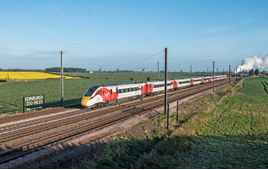Next year, full rollout of the ‘700s’ as part of the £6 billion Thameslink project will take place, with 115 of the trains in traffic as GTR operates the planned 24 trains per hour through the ‘Core’ between St Pancras International and Blackfriars. The ‘700s’ will also be introduced onto GTR’s Great Northern routes.
Meanwhile, GWR will extend its Class 387/1 operation to Didcot Parkway, as Network Rail switches on the OLE west of Maidenhead. This will trigger a cascade of DMUs further west.
And IEP trains will start operating on the East Coast Main Line for VTEC. June is the rumoured start date, although this has yet to be confirmed.
There are also huge variations in the types of deals. Two freight operating companies have ordered locomotives, including one that could revolutionise the freight sector. And a third freight operator is also talking to manufacturers regarding new diesel designs, as it looks to keep pace with ever-changing technology.
Meanwhile, orders have been placed for two train designs that were thought to be obsolete (certainly in terms of new orders for the UK), with locomotive-hauled coaching stock (LHCS) and diesel multiple units both to be delivered for TOCs.
And there could be the prospect of more LHCS for new franchises, depending on who the victorious bidders are.
Certainly, any suggestion after the May 1988 timetable change that new locomotives hauling new coaches would be an option for companies in 2017-18 would have been seen as fanciful, as two-car DMUs replaced LHCS formed of five, six or more coaches. But the demand created by the railway has led to these decisions being made.
As for the trains themselves, the days of the orders being a straight fight between Bombardier and Siemens are over. Hitachi Rail Europe broke into the UK market back in 2006 with the Class 395 order, and this was followed by the IEP order in 2012.
Other new entrants to the UK market are Stadler, which has won major deals with Greater Anglia and Merseytravel, and Construcciones Y Auxiliar de Ferrocarriles (CAF), which won significant orders last year due (in part) to its ability to deliver new trains quickly.
For this reason, CAF is building DMUs for Northern. The same overall order also included EMUs for the operator, in what is CAF’s biggest order for the European market. The Basque-based manufacturer is also building Mk 5 coaches for Caledonian Sleeper and TransPennine Express, as well as Class 397 EMUs for TPE.
Electric multiple units account for the majority of the new trains, with 5,047 vehicles ordered or delivered (78.6%). But there is an increase in the number of bi-mode trains, such as the Intercity Express Programme or AT300 fleets, while the bi-mode multiple unit (BMU) market is also increasing.
All told, there are 1,030 bi-mode vehicles on order, totalling 16% of all current orders. And more could follow, with Bombardier confirming that it is interested in the market.
Industry speculation suggests this could be one option explored for the East Midlands franchise’s new train fleet, with continued uncertainty regarding the erection of overhead line equipment beyond Corby on the Midland Main Line. The Canadian company, which has its UK headquarters in Derby, has also confirmed it would build DMUs again - if the market so desired.
Bombardier’s decision was confirmed before Network Rail Chief Executive Mark Carne told the industry that Control Period 6 (April 1 2019-March 31 2024) was unlikely to include a host of major new projects, such as electrification.
Carne has also spoken openly about possible ‘infill projects’ (RAIL 825), and how BMUs or even battery-powered trains could be used to create new duties on routes where otherwise DMUs would need to soldier on, while OLE schemes were ‘paused’, ‘deferred’, cancelled or simply never planned in the first place.
In the longer term, Alstom has unveiled its Hydrogen-powered Multiple Unit (HMU). This could be made available for the UK, but not for a few years, although the company does intend to offer it to franchise bidders in the future. Alstom has also launched a new EMU for the UK market, and has put it forward for recent franchises, although it has yet to win an order.
This year heralds the start of the IEP operations, but there are many more fleets being built and delivered across the UK. Britain’s UK train fleets are changing, and getting younger.
This feature was published in RAIL 830 on 1st July 2017
















Login to comment
Comments
No comments have been made yet.